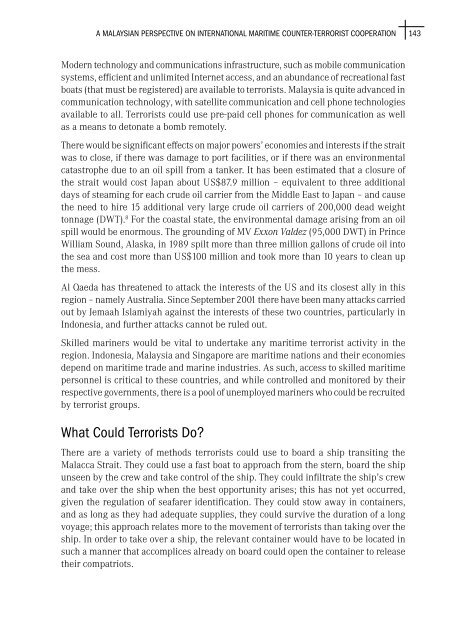Australian Maritime Issues 2007 - Royal Australian Navy
Australian Maritime Issues 2007 - Royal Australian Navy
Australian Maritime Issues 2007 - Royal Australian Navy
You also want an ePaper? Increase the reach of your titles
YUMPU automatically turns print PDFs into web optimized ePapers that Google loves.
A Malaysian Perspective on International <strong>Maritime</strong> Counter-Terrorist Cooperation<br />
143<br />
Modern technology and communications infrastructure, such as mobile communication<br />
systems, efficient and unlimited Internet access, and an abundance of recreational fast<br />
boats (that must be registered) are available to terrorists. Malaysia is quite advanced in<br />
communication technology, with satellite communication and cell phone technologies<br />
available to all. Terrorists could use pre-paid cell phones for communication as well<br />
as a means to detonate a bomb remotely.<br />
There would be significant effects on major powers’ economies and interests if the strait<br />
was to close, if there was damage to port facilities, or if there was an environmental<br />
catastrophe due to an oil spill from a tanker. It has been estimated that a closure of<br />
the strait would cost Japan about US$87.9 million – equivalent to three additional<br />
days of steaming for each crude oil carrier from the Middle East to Japan – and cause<br />
the need to hire 15 additional very large crude oil carriers of 200,000 dead weight<br />
tonnage (DWT). 8 For the coastal state, the environmental damage arising from an oil<br />
spill would be enormous. The grounding of MV Exxon Valdez (95,000 DWT) in Prince<br />
William Sound, Alaska, in 1989 spilt more than three million gallons of crude oil into<br />
the sea and cost more than US$100 million and took more than 10 years to clean up<br />
the mess.<br />
Al Qaeda has threatened to attack the interests of the US and its closest ally in this<br />
region – namely Australia. Since September 2001 there have been many attacks carried<br />
out by Jemaah Islamiyah against the interests of these two countries, particularly in<br />
Indonesia, and further attacks cannot be ruled out.<br />
Skilled mariners would be vital to undertake any maritime terrorist activity in the<br />
region. Indonesia, Malaysia and Singapore are maritime nations and their economies<br />
depend on maritime trade and marine industries. As such, access to skilled maritime<br />
personnel is critical to these countries, and while controlled and monitored by their<br />
respective governments, there is a pool of unemployed mariners who could be recruited<br />
by terrorist groups.<br />
What Could Terrorists Do?<br />
There are a variety of methods terrorists could use to board a ship transiting the<br />
Malacca Strait. They could use a fast boat to approach from the stern, board the ship<br />
unseen by the crew and take control of the ship. They could infiltrate the ship’s crew<br />
and take over the ship when the best opportunity arises; this has not yet occurred,<br />
given the regulation of seafarer identification. They could stow away in containers,<br />
and as long as they had adequate supplies, they could survive the duration of a long<br />
voyage; this approach relates more to the movement of terrorists than taking over the<br />
ship. In order to take over a ship, the relevant container would have to be located in<br />
such a manner that accomplices already on board could open the container to release<br />
their compatriots.
















